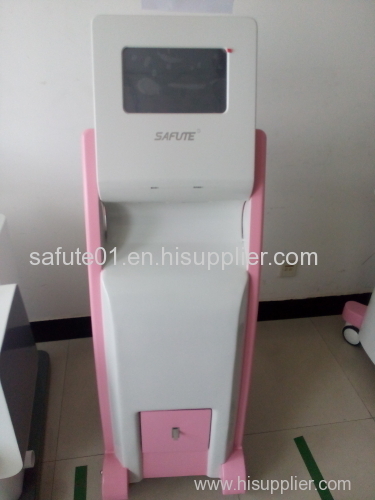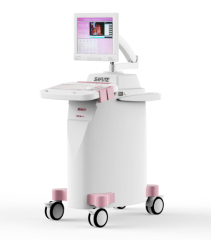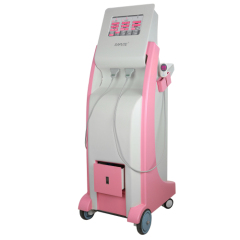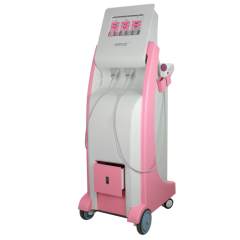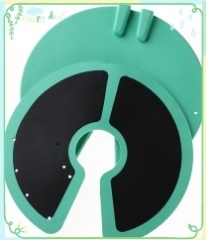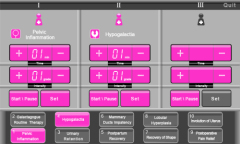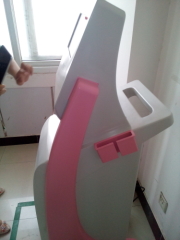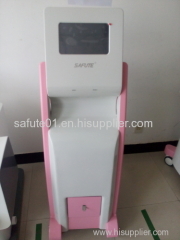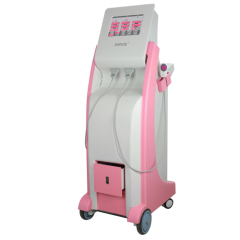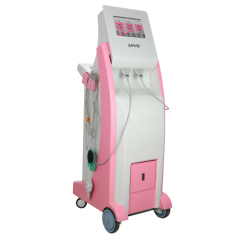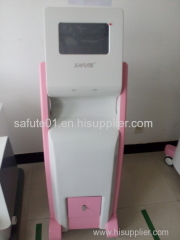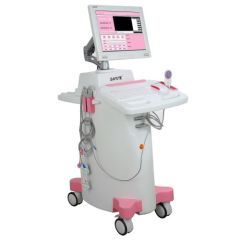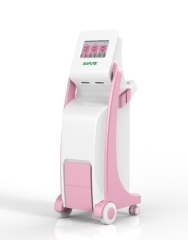
|
Zhengzhou Safute Electronic Equipment Co., Ltd
|
Obstetrical care device price
| Price: | 6000.0 USD |
| Payment Terms: | T/T,L/C,WU,Paypal |
| Place of Origin: | Henan, China (Mainland) |
| View the Video: |
|
|
|
|
| Add to My Favorites | |
| HiSupplier Escrow |
Product Detail
breast, ovary, uterus, pelvic floor, vaginal and body shape according to postpartum physical changes.
Obstetrical care device
Promote intestinal peristalsis, improving blood circulation, adjust visceral autonomic nervous system, promote intestinal exhaust, promote the contraction of the uterus, alleviate postpartum fatigue, alleviate the waist sour backache, the exhaust time ahead of 10 to 20 hours in average, promote normal diet, to ensure the adequate nutrition and physical recovery of maternal .
For the recovery of pelvic floor tissue, reduce postpartum perineal swelling side pain and postpartum hemorrhoids treatment, it has good effect .
Postpartum Depression
What Is It?
Postpartum refers to the period immediately after childbirth. When a woman has significant symptoms of depression during this period, she is said to have postpartum depression.
Postpartum depression is not the same as the "baby blues," a much more common condition that affects as many as 85% of new mothers. New moms often are emotionally sensitive and tend to cry easily. The baby blues is uncomfortable, but usually doesn't interfere with functioning as a mother, and it almost always goes away within a few weeks.
Postpartum depression is a different matter. It affects up to 15% of new mothers. It may begin at any time in the first two to three months after giving birth. The mother feels sad or hopeless and sometimes guilty or worthless. She is unable to concentrate and unable to take any interest in anything, even the baby. In some cases, the mother may feel overwhelmed by the baby's needs and become intensely anxious. This may lead to persistent troubling thoughts or obsessions about the baby's well-being and compulsive repetitive actions, such as checking on the baby constantly or phoning the pediatrician repeatedly to ask questions.
A woman is more likely to develop postpartum depression if she has:
A previous history of depression, including depression during pregnancy
A troubled marriage
Very few supportive family members or friends
A recent stress
Difficulty caring for her new infant, especially if the child has serious medical problems
Feeling depressed, with tearfulness or crying spells
Feeling anxious, sometimes with obsessions and compulsions, often about the baby's welfare or about being able to carry out responsibilities as a mother
Feeling hopeless, worthless or guilty
Feeling irritable or burdened
Losing interest or pleasure in all activities, including pleasure in being a mother
Changes in appetite (either overeating or not eating enough)
Sleep problems (for example, difficulty falling asleep or waking especially early)
Appearing slowed or agitated
Extreme exhaustion beyond the normal fatigue caused by caring for a newborn
Poor concentration or indecisiveness
Persistent thoughts about death, including suicide
Difficulty caring for the baby
Have you felt down, depressed or hopeless?
Do you feel little interest or pleasure in doing things?
Cognitive behavioral therapy is designed to examine and to help correct faulty, self-critical thought patterns.
Psychodynamic, insight-oriented or interpersonal psychotherapy can help a person sort out conflicts in important relationships or explore past events or issues that may have contributed to the symptoms.
Couples therapy can help the mother and father figure out how to manage possible areas of disagreement or how best to organize child care and muster support.
Teenage mothers, particularly if they come from families with few economic resources, have a particularly high risk of postpartum depression.
In a rare form of this disorder, which occurs in 1 out of 1,000 births, the mother becomes psychotic, that is, she is unable to recognize reality. This condition is sometimes called postpartum psychosis. The mother may have hallucinations (altered perceptions, for example, hearing or smelling things that are not there) or delusions (false beliefs, such as the idea that her baby is possessed by the devil).
This condition is most commonly associated with bipolar disorder. It is extremely dangerous for both the mother and the baby. And once it has happened it is highly likely to happen again if the mother has another child.
Researchers have many reasons to assume that biological changes contribute to these mood problems. In the weeks after delivery, significant swings occur in sex hormone levels and in the regulation of stress hormones. In postpartum depression, perhaps as a response to the hormonal shifts, there may be subtle changes in the parts of the brain that process emotion and in the brain regions responsible for managing social interactions. These changes are important not just for the mother, but also for the new baby.
Fewer than half of women with postpartum depression seek treatment for the problem. Some new mothers are unaware that postpartum depression is a real, treatable illness. Others believe that they are expected to feel happy after having a baby, and are so embarrassed about their symptoms that they do not ask for help.
Symptoms
A woman with postpartum depression can have any of the following symptoms:
These symptoms may develop in the first days after birth or as long as three months later.
Diagnosis
Primary care physicians, obstetrician/gynecologists and pediatricians may screen for postpartum depression by asking questions about the mother's quality of life. If you are a new mother, your doctor may ask about your emotions, your sleep and your appetite. You may be asked two questions for screening purposes:
Another scale frequently used for screening is the Edinburgh Postnatal Depression Scale. This is a 10-question scale that you can answer to give you and your doctor a measure of how depressed you might be. The scale with instructions is freely available online.
If your primary care doctor or obstetrician/gynecologist believes you have symptoms of postpartum depression, and these symptoms have lasted for several weeks without improving, he or she may offer you an antidepressant or refer you to a psychiatrist or other mental health clinician for further evaluation. If your doctor is concerned that some of your symptoms may be caused by a medical illness, he or she may order blood tests to check for such conditions as anemia or an underactive thyroid.
Expected Duration
Usually, symptoms of postpartum depression last for a few weeks before the condition is diagnosed. Without treatment, symptoms can last for months. With treatment, many women feel better within weeks.
Prevention
If you are pregnant, you may be able to decrease your risk of postpartum depression by preparing yourself before the birth for the changes in lifestyle that motherhood will bring. Talk to other mothers and to your doctor in very practical, day-to-day terms about what it's like to care for an infant. Don't underestimate how much time you'll need with your newborn. Clear out as much time as you can during the period after birth. Also, don't hesitate to ask for help from your partner and others who care about you.
Often, postpartum depression is difficult to combat without antidepressant treatment. If you have a history of depression, postpartum depression or bipolar disorder, you should talk with your doctor before the birth about the possibility of starting antidepressant medication soon after your baby is born. As a general rule, doctors try to minimize the amount of medication prescribed during pregnancy, but sometimes the risks of depression are more significant than the risk to the fetus. It is very important to discuss these trade-offs with your doctor.
Treatment
As with other types of depression, a combination of psychotherapy and medication is most helpful. If a mother is exhibiting signs of psychosis, she needs immediate medical attention.
The antidepressants used for treating other types of depression are also effective for postpartum depression. Among others, the choices include selective serotonin reuptake inhibitors (SSRIs) like fluoxetine and the serotonin-norepinephrine reuptake inhibitor (SNRI) venlafaxine. As with depression treatment in general, there are many medication options available. The treatment you choose will be influenced by such factors as potential side effects or past treatments.
If you are breastfeeding, you are likely to have questions about the possibility of passing medication to your newborn. There are wide variations in the concentration of antidepressant in breast milk, depending on such things as the dose, your metabolism and when your baby feeds. Fortunately, most studies show little effect on the baby. Many mothers do choose to take antidepressants, but it is important to discuss the choices with your doctors to assess the risks and the benefits in your situation.
A number of psychotherapy techniques have been proven helpful depending on the nature of the stress, the cause of the depression and personal preference. Every woman with postpartum depression needs support as well as education about depression. Various types of psychological therapy are available.
You may begin to feel relief soon after starting treatment, but it usually takes at least two to six weeks before a clear improvement can be seen. You may need to try a few different approaches to psychotherapy or medication before you find the method most helpful to you. Keep trying until you get the help you need.
When To Call a Professional
If you are a new mother, contact your doctor if you develop any symptoms of postpartum depression, especially anxiety, feelings of intense sadness or hopelessness, or difficulty sleeping. Call your doctor immediately if you have thoughts about harming yourself or the baby, or if you feel that you can no longer cope with caring for your new baby.
Prognosis
Most mothers with postpartum depression recover completely. This is especially true if the illness is diagnosed and treated early. About 50% of women who recover from postpartum depression develop the illness again after future pregnancies. To decrease this risk, some doctors suggest that women with a history of postpartum depression should start antidepressants immediately after the baby is delivered, before the onset of depression symptoms.
we are seeking global co-operation agents for our products.

